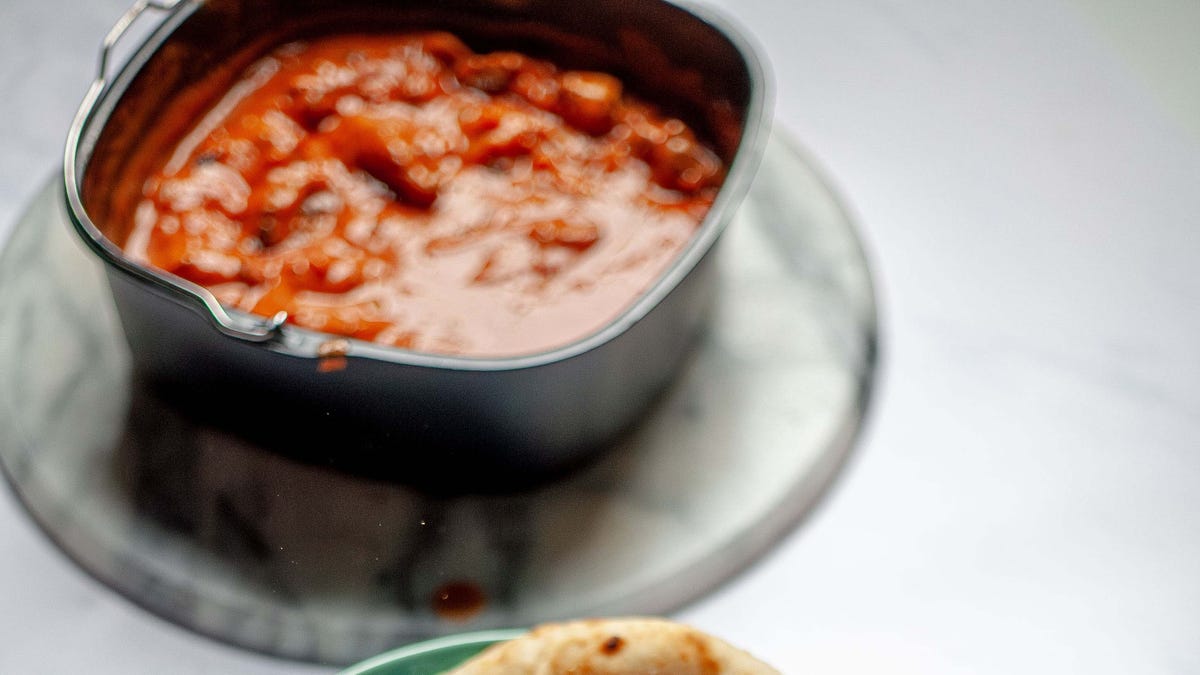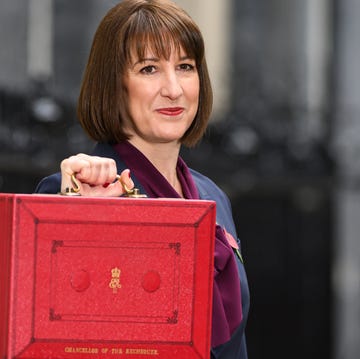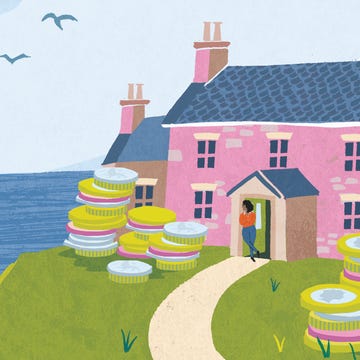Taking time off if you feel ill often feels like a luxury when your household depends on you to pay the bills. But it’s not it easy to power on through as Penny*, a self-employed mother of two, discovered the hard way. In order to protect herself, she took out income protection six years ago and now considers it an essential. But new research by Shepherds Friendly shows that only 14% of Brits have income protection despite 2.8 million Brits currently being signed off sick due to long-term illness or injury.
"After a decade of employment, working long hours in a senior position in a London marketing agency, I decided to take the plunge and become self-employed," says Penny. "The main motivators were work-life balance and extra time to explore creative writing projects. Little did I know at the time, motherhood wouldn’t be too far off. I love the freedom and flexibility of self-employment, I would never go back. The only real downside for me has been the lack of paid annual leave and sick pay," says Penny, 44, who runs her own communications consultancy in London.
"When you have young children, you’re more likely to catch bugs and viruses which isn’t ideal when you are self-employed. In 2018, I realised I’d had 15 back-to-back viruses and bugs in the last year, which was just madness. (Miraculously, somehow my partner who is employed, managed to avoid most of these!) I’d get over one, and a couple of weeks later, I’d be ill again.
"Feeling consistently rubbish is one thing, but also feeling an undercurrent of money anxiety made the situation more stressful. More often than not, back then, I just had to work through it, even when I felt like ‘death warmed up’. In hindsight, if I had rested more when I was ill, I probably would have avoided getting ill so often. It was really tough.
"I was missing so many working days - at least a week each month - and as I wasn't being paid for that time, I needed to have some kind of safety net. I read about income protection online and a colleague recommended an independent insurance broker.
"She explained how income protection worked and answered questions about different scenarios. Things like, what if I’m only unwell for two days, can I still claim? (Yes, with this policy.) Can I cancel it without much notice (also, a yes). The monthly premium I have with The Exeter was £36 a month at the start. I did the maths and realised that even if I was off one week a year (which felt likely) then I would ‘make the policy back’ effectively.
"I’ve had the policy six years now and the premium’s gone up to £48 a month, probably due to inflation. It's hard to say how much I’ve had as cash back per year because we had the pandemic in the middle but last year I had some bad luck with flu, sinusitis, laryngitis and Covid, and claimed around £1,500 - £2,000 for six weeks off work.
"I would say income protection is worth getting if you aren’t in a job where you get sick pay. Having it feels like a huge weight off me when I am ill, especially being a mum who has to juggle a lot. It’s an absolute essential – receiving sick pay isn’t a luxury, it’s a necessity."
How to protect your income
If the pandemic and tough economic climate has taught us anything, it’s how important it is to have financial resilience. According to the Association of British Insurers (ABI), a record number of us are taking out income protection insurance to safeguard our finances against the risk of illness or a serious accident stopping us working. Last year, sales of individual income protection policies were up on 2022 by a record 16%.
Income protection insurance pays you a regular income if you aren’t able to work due to illness or injury. It’s also known as permanent health insurance.
"During the pandemic, the furlough scheme was the first time we saw a national income protection programme in action, but it served as an important message, highlighting people’s reliance on their income and the fragility of the ability to cope once it stopped," says Jennifer Gilchrist, protection expert at Royal London. "The rising cost of living, too, may also have prompted consumers to think about their finances and how they would cope if unable to work," says Yvonne Braun, director of policy, long term savings, wealth and protection at the ABI.
How financially resilient are you?
Homeowners are three times more likely to have life insurance than income protection, even though statistically, it’s far more likely that during someone’s working life they will be off work due to illness or injury, rather than die. "It’s vital that people understand the importance of having cover beyond just life insurance. Income protection should be seen as a priority. If you are unable to work because of illness, there will come a point when your income stops, and you have to rely on savings if you have them,’ says Jennifer Gilchrist, protection expert at Royal London.
Gender protection gap
Like Penny, 43% of women worry about how their household would cope if they couldn’t support them financially, according to research by Scottish Widows. And Royal London’s Gender pension and wealth gap report 2024 shows almost one in five women surveyed said they would have nothing to fall back on. Women (37%) are more likely than men (32%) to rely on their partner or spouse financially should they find themselves unable to work.
Only 16% of female homeowners have income protection in place compared to 24% of men. 'There are likely several factors influencing this such as affordability as we know that on average women earn less than men making affording cover challenging. This gap also means women may prioritise other financial needs over insurance,' says Rose St Louis, protection director, Scottish Widows.
'Working patterns are a likely influence too as women tend to take time off for caregiving responsibilities, including for children and elderly family members, which can impact their ability to maintain continuous employment – a great example of why Income Protection is key,' says Rose.
Also, for the around 10% of women that are self-employed there are additional barriers such as reduced access to employment benefits, often lower and less regular earnings.
How does income protection work?
Income protection covers you if you can't work because of sickness or disability and continues until you return to paid work. It stops you having to dip into your savings or borrow to stay on top of the bills. You can expect to receive an average of 50-70% of your current monthly take-home pay, or net profit if you’re self-employed. This is because some money will be taken off for the state benefits you can claim, and also the income you get from the policy is tax-free.
The payouts are designed to cover regular outgoings, from mortgage/rent, bills and travel costs to childcare, grocery bills and credit card payments. "It doesn't matter what your income level is either, as people's outgoings are usually proportionate to their earnings. Whether you're a self-employed carpenter earning £40k a year or a dentist earning over £120k a year, if your income stops, there will only be so long that you can pay your mortgage, rent and other bills," says Chris Steele, editor, Mytribeinsurance.
How much does income protection cost?
For many of us, the biggest barrier to taking out income protection is the cost. While the younger you are, the cheaper it is, the size of your premiums depends on various factors, including your age, health, hobbies and lifestyle and your risk level at work. Check out typical premiums in our table below.
If this sounds like a lot of money, ask yourself this: How long could I survive without my income? How much could my outgoings be reduced if necessary?
Typical premiums based on age
Age | Monthly premium |
30 | £29.84 |
40 | £47.90 |
50 | £72.40 |
55 | £75.81 |
Our illustration is based on an employed finance manager earning £60,000 pre-tax, requiring £2,750 monthly cover, with a 90-day waiting period and benefit period to age 65. The applicant was a non-smoker with no medical history.
Quotes supplied on 18/09/2024 by myTribe, selecting the least expensive option.
Do I need income protection if I am employed?
If you are employed but your employer provides limited sickness benefits you may want to take out income protection to ensure you have enough to cover all essential living costs, including the mortgage. Typical options your employer might offer include:
- Paying the equivalent of Statutory Sick Pay for the first three days before SSP kicks in
- Topping up SSP by a set amount for a limited time
- Paying you a proportion of your salary (e.g. 75%) for a set period
- Or, if you are lucky, paying you full pay for a set period (e.g. for up to a year).
Don't wait until you are off-sick to check what provision your employer makes for you. If you have a lot of financial responsibilities and are the sole breadwinner, you might benefit from the extra cover.
How to cope with the bills when you're off-sick
As of 2023, around 2.8 million working age adults in the UK are not working due to long term sickness, up from 2 million pre-pandemic. According to Statistica, while the majority of people on long-term sick leave are over the age of 50, there has been a noticeable increase in those aged under 35 being off, too.
If you are employed…
* If you’re employed but you can’t work, you’ll usually get Statutory Sick Pay (SSP) from your employer for 28 weeks. You can't get SSP for the first three days you're off sick but after that you can get £116.75 a week for up to 28 weeks.
*You may also be able to get your employers’ sick pay, usually called contractual or occupational sick pay. This means that you get all or part of your regular salary for a set time if you can’t work. How much depends on your employer but typically it might be full pay for six months followed by a percentage of your salary for a set period. Check your employment contract or employee handbook.
If you’re self-employed…
The self-employed or those working in the gig economy are most at risk when it comes to losing their income. "Income protection insurance is arguably the most important type of protection self-employed people should consider, as in most cases, if they can't work, their income will stop," says Chris Steele.
"Self-employed and sole traders have the ongoing liability for their business costs if they’re off sick, so if they have to take time off work, they’re still liable for these costs in addition to their income stopping altogether or being reduced. This often leaves them feeling like they can’t afford to take time off work through sickness and this is where income protection plays a pivotal role," says Jennifer Gilchrist.
*You can’t get statutory sick pay if you are self-employed, but you may be eligible for Universal Credit. If you need advice on what you are entitled to Citizens Advice. You may also be eligible for other benefits.
*You might be able to claim employment and support allowance (ESA), as long as you’ve paid enough national insurance contributions for the past two tax years to gain sufficient national insurance credits. Check your National Insurance record for gaps.
How do I buy income protection insurance?
Firstly, if you are employed, ask your HR team whether income protection is included in the employee benefits programme. It may be offered as an add-on to medical insurance.
Otherwise, you can find polices at a comparison site such as Compare The Market, Go Compare, uSwitch and MoneySuperMarket but its well worth speaking to an insurance broker to ensure you have the right policy for your circumstances and is set up correctly to avoid nasty surprises down the line. "Most brokers don't charge you for their service; you'll get the same and sometimes better price than you would going direct. It's a safety net that I'd recommend," says Chris.
6 more things to know before you buy
*There are different types of income protection, from policies that cover a short period only to index-linked protection where the payout rises annually in line with inflation to occupation-specific protection.
*If you are self-employed, the insurer will look at your pre-tax profits over the last financial year to work out your average income. "If, like me, you go through a spell where you have high outgoings e.g. premises, training and travel costs etc, then the final amount of payout isn’t very high. For example, currently if I was off work for one month with an illness, I would only receive of a payout around £1000 even though my income is sometimes three or four times higher than this," says Penny.
* Most policies require your GP (or hospital doctor) to complete a form. Be warned, many GP surgeries charge for this and depending on how stretched their resources, can take time to respond.
*If you have any dangerous hobbies or a lifestyle that may include smoking, heavy drinking or drug taking, you may not be able to get illness insurance, according to Citizens Advice.
*Income protection won’t cover loss of income due to non-medical reasons, such as redundancy or certain pre-existing medical conditions or injuries caused by self-harm.
*'Your 'waiting period ' (deferred period) is a critical factor in the cost of your policy, along with your age, the amount of cover you'd like, and how long you'd like payments to continue. The longer you make that waiting period, the lower your premiums should be, as it reduces the risk of a claim,' says Chris.
The Financial Conduct Authority is planning to launch a market study of the protection market shortly, including income protection, following concerns about how products are sold and whether they represent good value.
What other types of illness insurance are there?
Critical illness insurance pays out a lump sum, or ongoing payments, if you are diagnosed with a specified illness. The most common issues covered are heart attack or stroke, loss of arms or legs, or diseases like cancer, multiple sclerosis or Parkinson's disease.
Term Life insurance covers you for a set 'term' or number of years, usually until retirement age. It pays a lump sum that’s commonly used to cover outstanding mortgage payments, if you die unexpectedly or prematurely. This is usually the cheapest cover when compared to income protection and life insurance because it's the least likely outcome.
*names changed















